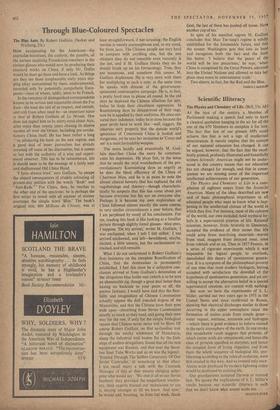Through Blue-Coloured Spectacles
How exasperating for he Americans—the journalist-historians, the analysts, the pundits,. all the earnest inquiring Foundation-members in the rimless-glasses who would now be producing their standard works on China, if only Mr. Dulles would let them go there and have a look. As things are they see those irreplaceable early years slip- ping aWay unexamined by them, undocumented, recorded only by potentially sympathetic Euro- peans—most of whom, oddly, seem to be French.
In the company of distinguished correspondents known to be serious and reasonable about the Far East—the kind the rest of us respect, and consult, and crib from when need be—an important name is that of Robert Guillain of Le Monde. One does not expect him to be starry-eyed about Asia, after more than twenty years chasing its elusive verities all over the Orient, including pre-revolu- tionary China itself. He has been rather a long 'lie producing his book on the new regime, and a good deal of lesser journalism has already creamed off some of his discoveries, but it comes at last with the authority of a wise and experi- enced observer. This has to be remembered, lest it should seem to be the musings of a fairly sour and disillusioned Old China Hand.
'I have always tried,' says Guillain, `to escape the absurd consequences of crudely colouring all present-day politics with the words "Reds" and "Anti-Reds."' For China, then, he reaches to the other end of the spectrum; he is perhaps the first writer to invest with all manner of sinister overtones the simple word 'Blue.' The book's original title, 600 Millions de Chinois, was at least straightforward, if not arresting; the English version is merely contemptuous and, to my mind, far from piste. The Chinese people are very hard to compare with anything else, but the one creature they do not resemble even remotely is the ant, and if M. Guillain thinks they do he should brush up on his formicology. True, they are numerous, and somehow this causes M. Guillain displeasure. He is very stern with them for multiplying at such a rate; at the same time he speaks with distaste of the government- sponsored contraceptive campaign. He is, in fact, a pretty hard man to please all round. In the old days he deplored the Chinese affection for dirt; today he finds their cleanliness oppressive. In Kuomintang days he disapproved of their rags; now he is appalled by their uniforms. He once cen- sured their indolence; today he is cross because the poor devils have to work like—well, niggers. He observes very properly that the outside world's ignorance of Communist China is foolish and dangerous, yet he says her invitation to 'Come and see' is a most formidable-weapon.
The more lucidly and evocatively M. Guil- lain desciibes China the more he communi- cates his depression. He plays fair, in the sense that he recalls the total wretchedness of the pre- revolutionary Kuomintang days as angrily as• he does the bleak efficiency of the China of Chairman Mao, and he is at pains to note the almost clinical honesty that has replaced the old vagabondage and thievery—though characteris- tically he suspects that this has come about just because everyone has his eye on everyone else. Perhaps it is because my own exploration of China followed almost exactly the same course, in very similar circumstances a year before, that I am perplexed by many of his conclusions. For me, reading this book is like looking at a familiar picture through slightly tinted glasses—blue ones, I suppose. 'On my arrival,' writes M. Guillain, 'I was enchanted, when I left I felt stifled.' I too arrived enchanted, and left—bewildered, maybe, excited, a little uneasy, but the enchantment re- mained, and still remains.
What I do not understand is Robert Guillain's firm insistence on the complete Russification of China, that the domination is permanently established. I feel this must be a subjective con- clusion arrived at from Guillain's detestation of the ubiquitous blue boiler-suit (which is to be sure an abominable rig, though a great deal better than having no backside to your pants at all, the prewar fashion). I would have said that the flexi- bility and imagination of Chinese Communism actually oppose the dull ironclad dogma of the
Muscovites, and that the Chinese have their eyes wide open—absorbing. from Soviet Communism
exactly as much as they need, and going their own way for the rest, if only for the simple biological reason that Chinese never never will be Slays. Of course Robert Guillain, on that so-familiar trek through the smoky wilderness, of Manchuria, along the industrial trail beaten flat by the foot-
steps of endless delegations, found that all the new equipment was Russian, and that over the Seam- less Steel Tube Works and so on was the legend :
'Erected Through The Selfless Generosity Of Our Soviet Comrades,' or something to that effect.
I too recall many a talk with the Comrade Manager of this or that steamy clanging enter- prise who would say : 'We owe it all to our Soviet brothers; they provided the magnificent machin- ery, their experts trained our technicians to use it, staying amongst us till we knew. And now,' he would add, beaming, 'as Spam last week, thank God, the last of them has pushed off home. Have another cup of tea.'
In spite of his manifest regrets M. Guillain concludes that Mao Tse-tung's regime is solidly established for the foreseeable future, and that the sooner Washington gets this into its head and recognises both the fact and the State the better. 'I believe that the peace of the world will be less precarious,' he says, 'when China is recognised by the Great Powers, admitted into the United Nations and allowed to take her place once more in international trade.'
Two cheers, in fact, for the Red and the Blue.
JAMES CAMERON


































 Previous page
Previous page